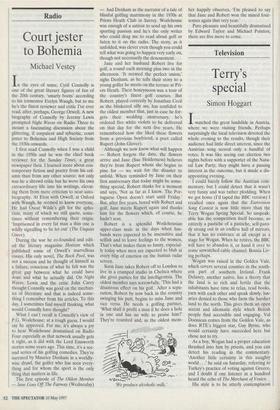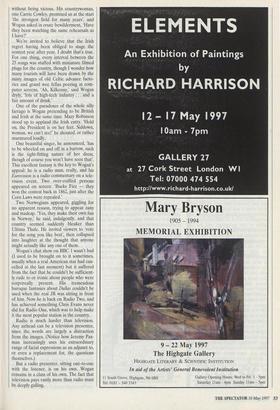Television
Terry's special
Simon Hoggart
Iwatched the great landslide in Austria, where we were visiting friends. Perhaps surprisingly the local television devoted the whole evening to the results, though their audience had little direct interest, since the Austrian song scored only a handful of votes. It was like seeing our election two nights before with a supporter of the Natu- ral Law Party; they might have a passing interest in the outcome, but it made a dis- appointing evening.
I could barely follow the Austrian com- mentary, but I could detect that it wasn't very funny and was rather plodding. When we got home (I'd taped the BBC version) I recalled once again that the Eurovision Song Contest is now little more than the Terry Wogan Spring Special. So unspeak- able has the competition itself become, so entirely a pastiche of a pastiche, self-paro- dy strung out in an endless hall of mirrors, that it has no existence at all except as a stage for Wogan. When he retires, the BBC will have to abandon it, or hand it over to some unwatched cable channel: Bosnia Liv- ing perhaps.
Wogan was raised in the Golden Vale, which covers several counties in the south- ern part of southern Ireland. Frank Delaney, another native, has a theory that the land is so rich and fertile that the inhabitants have time to relax, read books, yarn with each other and speak slowly, lux- uries denied to those who farm the harsher land to the north. This gives them an open accent and idiomatic style which British people find accessible and engaging. Val Doonican comes from the Golden Vale, as does RTE's biggest star, Gay Byrne, who would certainly have succeeded here but chose not to try.
As a boy, Wogan had a proper education thrashed into him by priests, and you can detect his reading in the commentary. 'Another little certainty in this naughty world ...' he said on Saturday, referring to Turkey's practice of voting against Greece, and I doubt if one listener in a hundred heard the echo of The Merchant of Venice.
His style is to be utterly contemptuous without being vicious. His countrywoman, one Carrie Cowley, promised us at the start 'the strongest field for many years', and Wogan asked in ersatz bewilderment, 'Have they been watching the same rehearsals as I have?'
We're invited to believe that the Irish regret having been obliged to stage the contest year after year. I doubt that's true. For one thing, every interval between the 25 songs was stuffed with miniature filmed plugs for the country, though I wonder how many tourists will have been drawn by the misty images of old Celtic advance facto- ries and grand wee fellas peering at com- puter screens. `Ah, Kilkenny,' said Wogan dryly, 'lots of high-tech industry. . . and a fair amount of drink.'
One of the paradoxes of the whole silly farrago is Wogan pretending to be British and Irish at the same time. Mary Robinson stood up to applaud the Irish entry. 'Hold on, the President is on her feet. Siddown, woman, we can't see!' he shouted, or rather murmured loudly.
One beautiful singer, he announced, 'has to be wheeled on and off in a barrow, such is the tight-fitting nature of her dress, though of course you won't have seen that'. This excellent fantasy is the key to Wogan's appeal: he is a radio man, really, and his EurovLsion is a radio commentary on a tele- vision event. Two over-coiffed persons appeared on screen: 'Bucks Fizz — they won the contest back in 1862, just after the Corn Laws were repealed.'
Two Norwegians appeared, giggling for no apparent reason, trying to appear zany and madcap. 'Yes, they make their own fun in Norway,' he said, indulgently, and that country seemed suddenly bleaker than Ultima Thule. He invited viewers to 'vote for the song you like best', then collapsed into laughter at the thought that anyone might actually like any one of them.
Wogan's chat show on BBC 1 wasn't bad (I used to be brought on to it sometimes, usually when a real American star had can- celled at the last moment) but it suffered from the fact that he couldn't be sufficient- ly rude to or ironic about people who were corporeally present. His tremendous baroque fantasies about Dallas couldn't be used when the real JR was sitting in front of him. Now he is back on Radio Two, and has achieved something Chris Evans never did for Radio One, which was to help make it the most popular station in the country.
Radio is much harder than television. Any airhead can be a television presenter, since the words are largely a distraction from the images. (Notice how Jeremy Pax- man increasingly uses his extraordinary range of facial expressions as an adjunct to, or even a replacement for, the questions themselves.) But a radio presenter, sitting one-to-one with the listener, is on his own. Wogan remains in a class of his own. The fact that television pays vastly more than radio must be deeply galling.



































































 Previous page
Previous page